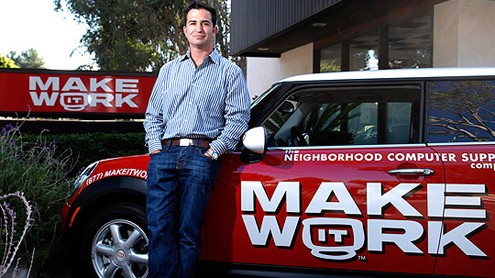Make It Work ran out of gas on Mini leases
IN THIS ARTICLE
- Small Business Topic
- Stephen Nellis Author
By Stephen Nellis Friday, July 27th, 2012

Make It Work founder Eric Greenspan in a Business Times file photo with one of the IT firm’s signature Mini Coopers. (Stephen Nellis/Business Times file photo)
Make It Work’s signature red Mini Coopers may have been the key to the company’s undoing when the vehicle’s owners sued for $26,546 in back lease payments on them.
The Santa Barbara-based tech support firm closed its doors on June 25, putting two dozen technicians out of work and leaving behind a trail of angry customers who had purchased pre-paid support contracts that became worthless.
Until then, though, Make It Work’s employees zipped around Southern California in brightly branded versions of the British compact Mini, many of them outfitted with premium packages that included leather seats, onboard computers and chrome trim. The cars cost between $263 and $583 per month to lease, and at its height, Make It Work employees drove nearly 40 of them.
The cars were the company’s calling card but strained its budgets as much as a year before CEO Eric Greenspan said Make It Work “ran out of money.” In June 2011, Make It Work handed a dozen of the cars back over to its leasing company, Automotive Leasing of New Jersey, and in November of that year defaulted on $26,546 it owed for use of the Minis, according to court documents filed in Santa Barbara County Superior Court.
The two companies settled the matter, but Make It Work owed at least $15,500 when it shut down, according to an analysis of court documents, and it isn’t clear whether the defunct firm continues to make payments.
Meanwhile, customers who tapped Make It Work’s short-lived attempt at building websites for individuals and small businesses say they paid the firm thousands of dollars for work that wasn’t performed as promised and have won court judgments. And Make It Work’s former technicians continue to struggle to find work in the region and said they have yet to hear from the company about their last paycheck.
Greenspan said the company liquidated much of the equipment in order to pay creditors.
However, neither Make It Work nor Greenspan have filed for bankruptcy, and Greenspan declined to tell the Business Times how much money the company owed creditors, customers and former employees when it closed its doors or how much capital the equipment liquidation raised. It remains unclear whether anyone owed money by Make It Work will be repaid. Unless creditors force the issue in a lawsuit or involuntary bankruptcy filing, it is largely Greenspan’s discretion that decides who gets repaid.
Here’s a closer look at the continuing fallout from Make It Work’s demise.
Minis surrendered
In June 2011, Make It Work “voluntarily surrendered” one dozen of its Mini Coopers to Automotive Leasing. The cars, most loaded with premium appointments, cost as much as $583 a month to rent and cost the company a total of $3,960 a month. The rate implies Make It Work paid nearly $12,000 a month to lease Mini Coopers when the company was at its height with 40 technicians.
After Make It Work turned over a dozen of its Minis, Automotive Leasing sold the cars and applied the proceeds to Make It Work’s bill. A total of $26,546 remained, and in November 2011 Make It Work defaulted on its payments.
Earlier this year, Make It Work settled the case for $28,500. The terms say that Make It Work wired a $10,000 payment to Automotive Leasing in March and was supposed to pay $2,000 each month thereafter until it reached the settlement total.
Assuming that Make It Work made its payments for April, May and June, the company owed $15,500 on the settlement when it closed. It’s unclear whether Make It Work is current on its settlement payments. An attorney for Automotive Leasing declined to comment because the case remains open until the settlement is repaid.
Small-claims battle
Mark Williams has won two judgments against Make It Work in Santa Barbara County Superior Court.
The first was $4,266 for a website project he said Make It Work never completed, and the second was a $1,366 refund for pre-paid service contracts because he was unhappy with the company’s work. He told the Business Times he doesn’t expect to collect on either.
In early 2011, Williams contacted Make It Work to help him build a website for a nonprofit incubator service he was planning to launch. The service would handle back-end operations for young nonprofits, and while Williams had worked with a graphic designer on the web service’s front end, he needed technical expertise for functions such as transactions. At the time, Make It Work was offering to build sites for $1,000.
Williams met with Make It Work’s engineers and was impressed when they told him they could include features like automatic integration with standard accounting software.
“These guys were on top of it. These guys really knew their stuff,” he said. But because of the complexity of the site, the price rose to $5,000.
Williams paid $4,000 of the total before the site was complete. Months later, with little progress to show on the project, Williams unexpectedly received an abrupt notice that Make It Work was no longer in the web development business and that his project had been transferred to a different firm in Irvine. When Williams tried to contact Make It Work, all of the people he’d worked with on the project were no longer at the company.
“We offered him a full refund of his $4,000, he didn’t accept,” Make It Work’s Greenspan said in an email.
Williams said he didn’t take the refund because Make It Work wanted him to sign a general liability release stating he wouldn’t sue the company after taking the refund, but Williams wanted to pursue claims that he was also owed for lost time and money. “I think [Greenspan] was stalling me,” Williams said.
The judge later threw out claims of lost time and money and awarded Williams only the refund amount, which Greenspan said wasn’t paid. “[H]is judgment was never paid because the company ran out of money and shut down,” Greenspan said.
Lost opportunities
Jorge Gaona started working at Make It Work in January as a technician and lost his job when the company closed. He is still thankful that the company took a chance on him – he was taking a full course load at Santa Barbara City College at the time.
“I was a full-time student, and Make It Work gave me the opportunity to go to school and work at the same time. It was awesome of them – I was blessed they gave me the opportunity to do that,” Gaona said. “I hoped to stay there five years.”
Gaona finished his studies and now needs to find another job to support himself. If he doesn’t find one, he may have to leave the area to be closer to family. He said he has thought about starting his own consulting business but doesn’t have the means.
“It’s tough right now to start one. I only have $48 to my name. It’s tough to start my own company with that,” Gaona said.












